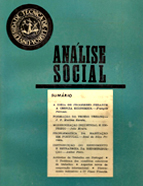

................................
The journal Análise Social entered its 55 th year of publication in 2020. From its founding in 1963 until December 2019, it published a total of 233 quarterly issues (some of which were double and triple issues). With only one temporary interruption in regular publication in 1974 and 1975 for financial reasons, Análise Social is a rare case of success and longevity in the landscape of Portuguese social science journals. Its current editorial status includes history as one of its core areas of publication, and it is also classified as a history journal (in addition to social sciences) in international indexing systems. The journal is published quarterly in print and electronic formats, and its content is available free of charge via open access:
The journal has been owned by the Instituto de Ciências Sociais [Institute of Social Sciences] (ICS) of the Universidade de Lisboa [University of Lisbon] since 1982. It is an institutional asset rooted in the direct history of the ICS. During its first 20 years of publication (between 1963 and 1982), it was owned by the Gabinete de Investigações Sociais [Social Research Office] (GIS), an advanced social science research institution that gave rise to the ICS. The GIS and Análise Social were part of the Instituto Superior de Ciências Económicas e Financeiras [ Higher Institute of Economic and Financial Sciences] (ISCEF), later renamed Instituto Superior de Economia [ Higher Institute of Economics] (ISE), of the Universidade Técnica de Lisboa [Technical University of Lisbon], between 1963 and 1975. From 1976 (Vol. XII, No. 45) until it was incorporated (with the GIS) into the structures of the Universidade de Lisboa [University of Lisbon] in 1982 (Vol. XVIII, No. 70), Análise Social existed as an autonomous institution, with financial support from the Calouste Gulbenkian Foundation, the Junta Nacional de Investigação Científica e Tecnológica [National Board for Scientific and Technological Research] (JNICT) and the Instituto Nacional de Investigação Científica [National Institute for Scientific Research] (INIC).
This work is financed by national funds through FCT - Foundation for Science and Technology, I.P, in the scope of the projects UIDB/04311/2020 and UIDP/04311/2020.
